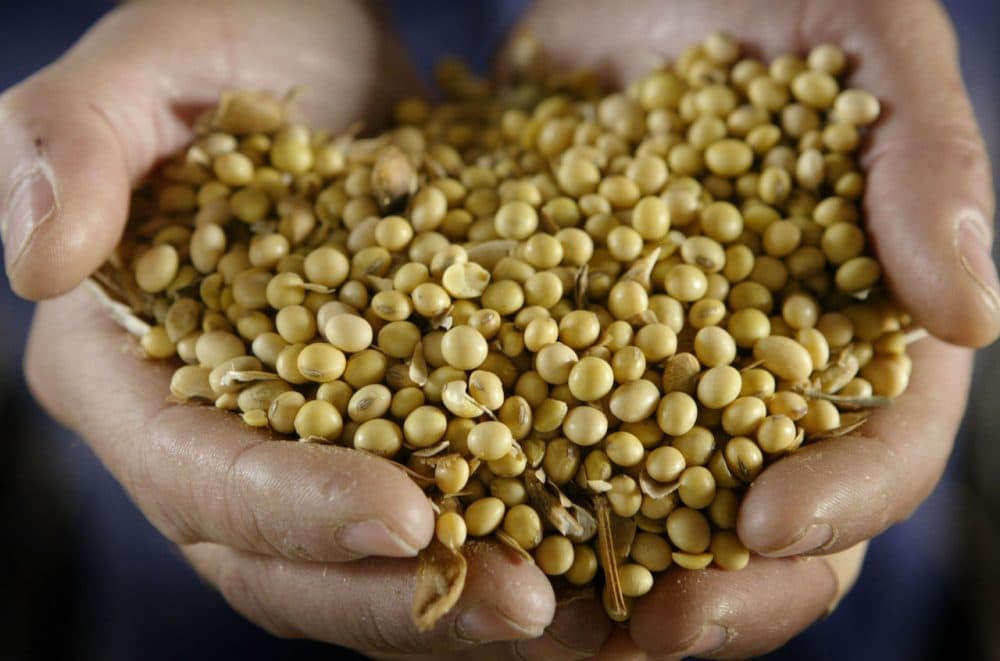Advertisement
Two Sides Of The GMO Debate

Now that the House has passed a bill that would make it illegal for states to force food manufacturers to label foods made with genetically modified crops - also called GMOs (genetically modified organisms) - the Senate debate on the issue is next.
Here & Now's Jeremy Hobson moderates a conversation with Michael Gruber of the Grocery Manufacturing Association, who supports the bill, and Richard Eidlin of the American Sustainable Business Council, who is against it.
Interview Highlights
On why they support or don't support the bill
Michael Gruber: "We're trying to prevent a patchwork of state labeling laws. We've been fighting this since about 2012, in states like California, Oregon, Washington and Colorado. We really believe that the federal government is the best place to manage our labeling laws and labeling guidance. It's been doing it for over 100 years, and so states like Vermont that have come in with their own set of standards for labeling for genetically engineered ingredients is really disruptive."
Richard Eidlin: "We have a really different perspective, which is markets work best when consumers have adequate information. So we really feel that's a basic tenet of a successful, thriving free market. And we know that millions of Americans and poll after poll show that over 80 percent of the public wants labeling. And we're not debating whether GMOs are safe or not safe. We're suggesting as a business organization that transparency is a really important factor in a successful market."
On why some people are concerned about GMOs
Gruber: "I think GMOs have been victim of a multi-year campaign to try to instill fear about this technology. We know more about this technology than we do about conventionally-bred plants. And it's been very effective. I think you do have people that honestly are concerned about it, but there's a lot of misinformation. Some people will never accept the technology."
Eidlin: "I think there's a narrow and a broad way to look at that. So there's scientific evidence to suggest that there are possible dangers of GMOs, there's also a number of studies, many studies, that suggest it isn't a problem. But if you go beyond the actual GMO, there are questions of its resistance to pesticides and then its impact on the larger environment. So we're concerned from an environmental perspective that GMOs may contribute to water depletion, may contribute to climate change... With GMOs, there's a tremendous amount of water that's required. It's very energy intensive to use. And they also have all kinds of other residual impacts on the natural environment."
Would people be less likely to buy a product with a GMO label?
Eidlin: "I think consumers would have a choice, just as they have a choice deciding what automobile to purchase, or a food product, or what type of mortgage to secure based on the interest rate. So our basic premise from a business perspective is that markets often need direction to make some right choices, and we think that providing consumers with this kind of information will allow them to make smarter choices. They can choose to buy products that are labeled GMO, or they can choose not to."
On where our food supply would be without GMOs
Gruber: "I think it would be very disruptive, because right now the vast majority of corn and soybeans and sugar beets are genetically engineered, for one reason or another, whether it's pest resistance or herbicide resistance or drought resistance. So the conundrum for the companies that make this food is that if they are required to have a warning label of some type on their product, do they reformulate, resource to conventional ingredients, which right now are far more expensive and so scarce that there's not even a commodities exchange for some of those non-GMO ingredients."
Guest
- Michael Gruber, vice president of the Grocery Manufacturing Association.
- Richard Eidlin, vice president of the American Sustainable Business Council. He tweets @GreaterGoodDenv.
This segment aired on July 29, 2015.